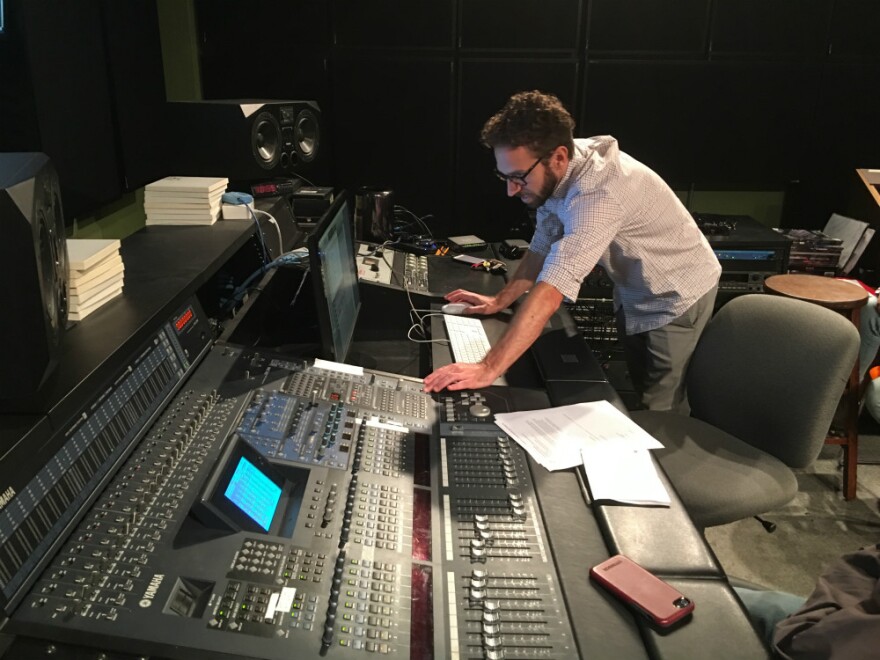High school musicians may spend the summer practicing their instrument or making music with friends. More than a dozen of them just spent a week exploring another part of the music world at an unusual summer camp — an audio production camp at the University of Texas at Arlington.
On one side of the glass, UT-Arlington’s jazz camp septet is playing their Afro Blue chart in the recording studio on campus.
On the other side of the glass are 14 North Texas high school kids and one from out of state listening to the digital mono mix through a pair of professional Adam Audio S3A speakers.
Micah Hayes, who runs the music industry program at UT-Arlington, is head counselor for the week’s audio production camp. He wants these campers to know what audio production is really like, showing them the different kinds of microphones and speakers.
But he also wants to show them what's possible.
"We talked about things like film scoring. They do a little live sound," he said. "They do a few other things just to introduce them to things they may not have experienced before with audio."

Hayes didn’t experience any of these studio techniques until college at Chico State in California. After graduating, he became a recording engineer with the New World Symphony, got a composition degree, then engineered events like the Aspen Music Festival. He says he would have loved this production camp in high school.
“I would have probably started at least experimenting on my own, earlier,” Hayes said. “I didn’t know a lot about this stuff so I didn’t start experimenting until college or even after college.”
Camper Brennan Youngblood likes the head start. The Garland High School bass and sax player has made recordings with his school and church bands.
“One thing that’s always bothered me has been bad mixes from either myself or other engineers," Brennan said. "And I’ve always just wanted to improve the way the music sounds and have the control over that.”
Kamaria Cozart, a 17-year-old from Wichita East High School in Kansas, also plays several instruments. She almost signed up for the jazz camp in Arlington, but really wants to produce her own music, so she chose the audio production course.
“One slight difference in where you put a microphone can change the whole thing," Kamaria said. "There are so many different types of mics, I’m probably not going to remember all of those.”
Hayes, the camp director, chimed in.
"The trumpet, for example, works really well with a ribbon microphone, an older mic," he said. "Kind of an old Bing Crosby singing into a microphone type of sound.”
As a trumpet solo is heard, Hayes says there’s usually a right and wrong mic for each instrument.
"And it (the ribbon microphone) just sounds fantastic in there, but a lot of other instruments don’t," he said. "They sound terrible with a ribbon mic.”
Various microphone types and their uses: That was new information to Crowley High senior Zhana Woodard.
“I’m definitely going to take that piece of information home with me so I know more when I go back to my home studio, so I can get a better quality,” Zhana says.
Granted, her home studio is pretty much just a corner of her bedroom. Her younger Crowley classmate, 16-year-old junior Sheldon Blair Jackson III, signed up for this class wanting to focus on live ensemble recordings.
“When you produce with live instruments you get that special raw sound, so I’m kind of leaning toward that,” Sheldon says.
Teaching live recording and post production techniques is Michael Johnson, one of Hayes’ undergraduate students.
“Since this room doesn’t have a lot of natural reverb because we deadened it and we put bodies in it, so it’s a little bit dryer than normal,” Johnson says. “We’ll work with reverb and kind of make it sound like it’s in a bigger room.”
After exposure to these production and final-mix tips all week, Hayes says campers get an honest, inside look at what this world’s really like.
“There’s a lot to know,” Hayes says. “There’s a lot of technical information you have to learn. There’s a lot of down time when they sit around and it’s not as, you know, maybe romantic as some people think it might be.”
That’s why Hayes figures if any of these campers are as excited at the end of the week as they were at the beginning, he may see them back here in a few years.






